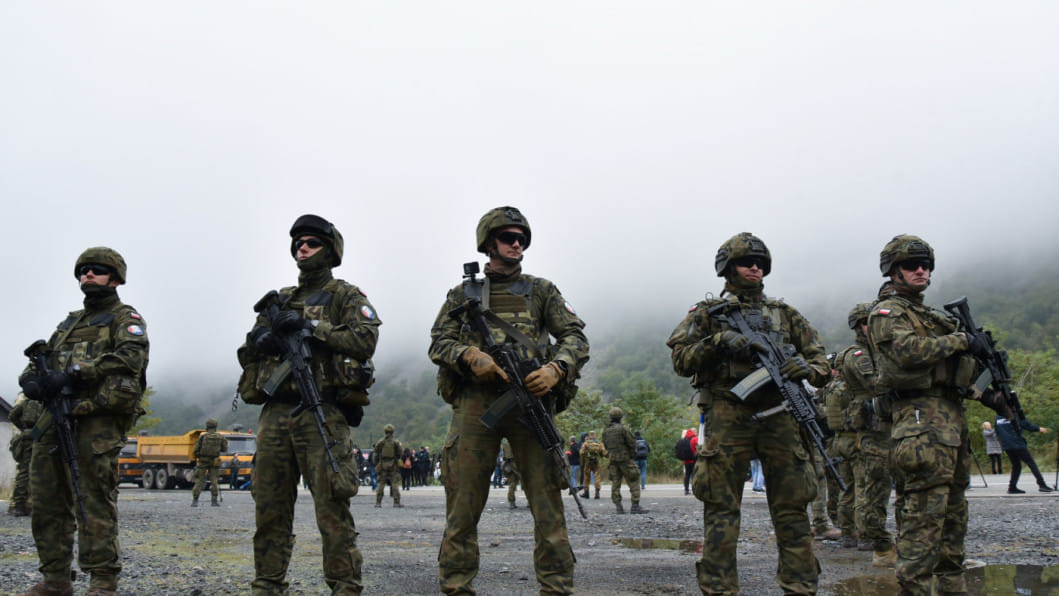Degeneracy, Depravity, and the New Right

A recent crisis in northern Kosovo came and went quickly, because nobody wanted an escalation. But it will return, because Russia is manoeuvring in the Balkan shadows to stoke the tensions that gave rise to it. The mundane origin of the crisis shows how easily a spark can be fanned into a conflagration.
The Kosovo government had announced a measure requiring Serbs living in northern Kosovo to apply for local license plates, replacing their Serbian plates. But Serbs staged protests (with reports of gunfire) and road blockades at two border crossings, pushing Kosovo authorities to delay the measure for a month while they discuss next steps.
Serbia has long had a similar rule for Kosovar licence-plate holders on its territory, and Kosovo was merely trying to apply the same standard. The problem, of course, is that Serbia doesn't recognize Kosovo as an independent state, even though the United States and around 100 other countries do.
This would be a purely local story were it not implicated in the geopolitical dynamic triggered by Russia's war of aggression in Ukraine. But as Vladimir Đukanović, an MP from the ruling Serbian Progressive Party, channelling Russia's rationale for invading Ukraine, recently mused, "Serbia might be forced to engage in the 'denazification' of the Balkans." Even the expression "forced to engage" echoes the Kremlin's farcical line about being provoked by Nato aggression to invade Ukraine.

Moreover, Đukanović's reference to "the Balkans" follows the same logic as the Russian line, which implies that all of Europe, caught in the vortex of self-destructive degeneracy (LGBTQ+, same-sex marriage, no clear gender distinctions, and so forth), ultimately will have to be "denazified." As Aleksandr Dugin, Russian President Vladimir Putin's court philosopher, explains, "We are fighting the absolute evil, embodied in Western civilisation, its liberal-totalitarian hegemony, in Ukrainian Nazism…"
According to this new conservativism, Nazism, Communism, and woke hedonism all amount to the same thing. But this corralling of opposites really is too much even for a hardline Hegelian. It reveals the glaring inconsistency not just of Kremlin propagandists but also of the pro-Russian US and European alt-right, which claim to embody traditional Christian values even as their words and actions countenance genocide and glorify sexual violence.
As a leading player in this culture war, the Kremlin has been intervening through its proxies not only in Kosovo but also in Bosnia, which it has warned against Nato membership. Unfortunately, the Western leftists and pacifists have chosen simply to ignore the geopolitical dimension of Putin's "denazification" project. As Jeremy Corbyn, the former British Labour Party leader, recently complained, "Pouring arms in [to Ukraine] isn't going to bring about a solution, it's only going to prolong and exaggerate this war. We might be in for years and years of a war in Ukraine."
Implicit in this position is that Western governments should simply let Russia occupy Ukraine. Yet it is an odd "pacifism" that applies pressure on the victim (which must not defend itself too vigorously) and its supporters (which must not help the aggressor's target too much), rather than on the attacker.
Western "pacifists" insist that we "de-demonise" Putin. There will have to be some kind of negotiation sooner or later, so we should treat him as a future partner. In fact, we should do the exact opposite: The attack on Ukraine compels us to re-demonise Putin, not personally but as an exponent of a dangerous geopolitical and ideological project.
There is mounting evidence that Russia is changing into something that is radically foreign to denizens of today's Western democracies, but all too familiar to students of European history. Consider the Russian Liberal Democratic Party's recent proposal to replace the term "president" with "pravitel" ("ruler"). The former, according to the party, has "always embarrassed us," because it was first used in the US, spreading to the rest of the world only "much later."
While the new right's main ideological target is Western "degeneracy," its fascination with strongman rule is permeated with obscenity. In a recent campaign appearance, Kari Lake, the Republican gubernatorial candidate in Arizona, gushed that her fellow Republicans Donald Trump and Florida Governor Ron DeSantis have "big dick energy."
This is a necessary, rather than contingent, feature of the new right's defence of Christianity. To attract enough followers, its leaders must provide the surplus enjoyment ("the pure surplus of enjoyment over standard satisfactions") of the obscene. An ideology that allows its adherents to act on their worst impulses can mobilise millions.
To take another example, is Russia's "peacemaking military intervention" in Ukraine not like the "legitimate rape" that US Representative Todd Akin, then the Republican Senate nominee from Missouri, defined in 2012? According to Akin, abortion should be banned outright, because if a woman suffers "legitimate rape," her body will somehow know not to get pregnant.
Facing outrage at the remark, Akin claimed that he had "misspoken." What he meant was that there are "legitimate cases of rape" that police refer to "when they're doing an investigation or whatever." But his basic message remained: If a woman gets pregnant from rape, she must have secretly wanted it, because otherwise her body's "stress" response would have prevented it.
It is telling that Putin has referred to Ukraine in the same way. At a press conference on February 7, he mocked the Ukraine government's objections to the Minsk agreements, adding, "Like it or not, it's your duty, my beauty." The sexual connotations of that line are well known for Russians and Ukrainians from "Sleeping Beauty in a Coffin," by the Soviet-era punk rock group Red Mold: "Sleeping beauty in a coffin, I crept up and fucked her. Like it, or dislike it, sleep my beauty."
The implication is that the rape of a country sometimes is justified. The victim was asking for it. As with rape, what motivates the New Right is not love, but domination.
Dr Slavoj Žižek, professor of philosophy at the European Graduate School, is international director of the Birkbeck Institute for the Humanities at the University of London and the author of Heaven in Disorder.
Copyright: Project Syndicate, 2022
www.project-syndicate.org
(Exclusive to The Daily Star)

 For all latest news, follow The Daily Star's Google News channel.
For all latest news, follow The Daily Star's Google News channel. 



Comments